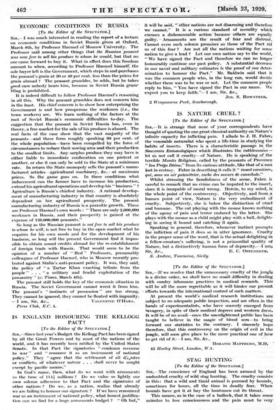IS NATURE CRUEL.?
[To the Editor of the SPECTATOR:]' SIR,—It is strange that none of your correspondents have thought of quoting the one great classical authority on Nature's infinite capacity for inflicting pain. I allude to J. H. Fibre; the venerable naturalist who spent a life-time in studying the
habits of insects. There is a characteristic passage in the ,
Souvenirs Entomologiques which illustrates the ruthlessness— let us not call it cruelty—of Nature. He is speaking of the terrible Mantis Religiosa, called by the peasants of Provence " ku Prig° Mimi," from its curious attitude, lam that of a nun lost in ecstasy. Fabre in describing it calls it " insect carnivore, qui, sous un air patenatrier, cache des mceurs de cannibale."
Whilst stressing the fiendishness Of the scene, Fabre is careful to remark that no Mine can be imputed to the insect; since it is incapable of moral wrong. Herein, to my mind, is the whole point of the controversy. Objectively, and froth a- human point of view, Nature is the very embodiinent cruelty. Subjectively, she is beloW the diStinction of - cruel and humane. The 'cat playing with the mouse knows nothing of the agony of pain and terror endured by the latter. She plays with the mouse as a child might play with a ball, delight- ing in seeing it bound and catching it again.
Speaking in general, therefore, whenever instinct prompts the infliction of pain it does so in utter ignorance. Cruelty in the proper sense of the word, that-is the actual delighting in a fellow-creature's suffering, is not a primordial quality of Nature, but a distinctively human form of depravity.—I ami
Sir, &c., E. C. OPPENIIEIM. S. Andrea, Taormina,
















































 Previous page
Previous page